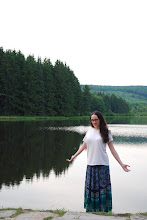Werner Herzog likens Antarctica to an alien landscape as well as to a cathedral, through voice-over and music in a 2007 narrative of his experience near the South Pole. He begins by constraining the time and place, saying there are only 4 months of the year that planes can land where his flight landed. He tells us the scenery was not what he'd expected; he was disappointed. (Later, we also see the landscapes postcards generally proclaim) And though he told the agency who funded his film he wouldn't be talking about penguins, an adorable array of penguins (as well as a dissociable penguin researcher) waddle into the film anyway. He characterizes a certain penguin as deranged for deserting its flock and heading inland interminably, in a clear comparison to people who've left their place of origin and moved to Antarctica.
What I found most interesting about this piece as a whole was that the opening credit before the picture faded in was 'a film by Werner Herzog'. This simple line of text reinforces the subjective, the author's narrative, the authority by default and disclaims 'truth' more so than if it were merely to state the title and begin. He produces opinions vocally as well as by holding particularly odd shots much longer than a traditional videographer would.... par example, while underwater, a shot of some twirling creature shaped like a vanilla wafer (oblong, oval) which has light glowing through it, for nearly a full minute. In film, this is generally a horrible decision. The audience loses interest, or begins to analyze the psychoses of the filmmaker.
Another intriguing aspect of his 'artistic eye' or possibly simply his method of operation is that he has little concern for making people uncomfortable. He seems to have an understanding of how humans react to cameras, and an interest in the same. He knows they're more likely to answer questions without regard for their audience. He knows if you stand there long enough filming, people will approach. He watches as subjects move from performing for the camera and hamming it up, to waiting for him to turn it off, to embarrassed, to ever-goofier voguing. This film is less interested in the scientific research of life and geology at the South Pole than in the social science of the people who live there. This is an incredibly interesting angle, since it is not a natural place of habitation for humans. It is artificially colonized by scientists and adventure-seekers.
The visuals are colorful and unexpected (undersea critters that I had never seen and some I'd only heard of) and the score is incredible, composed for the film. His words were audibly pronounced and easy to follow, though accented in a way I'd never heard before. Developing insight into Herzog's mindset was unavoidable, as well as a taste of the impetus people acquire for what adventure lies in store in Antarctica.
Subscribe to:
Post Comments (Atom)

No comments:
Post a Comment